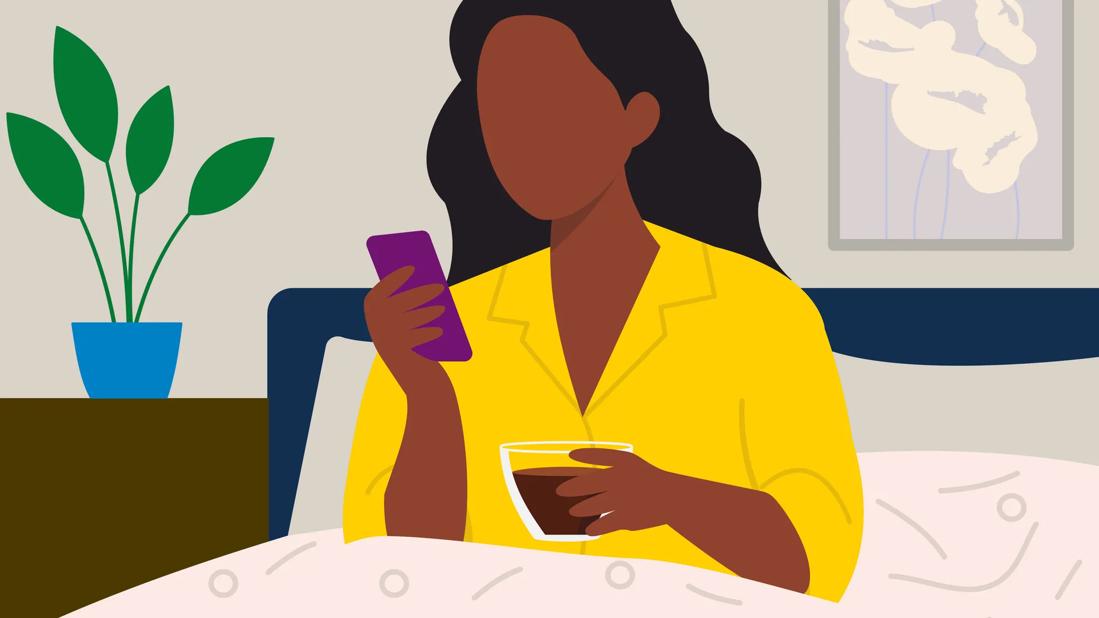This trendy practice may boost your physical and mental health — but done incorrectly, it could make things worse

Image content: This image is available to view online.
View image online (https://assets.clevelandclinic.org/transform/9c9ba29f-7be8-43dc-b339-f8dd757cab7b/bed-rotting-2218558037)
Person sitting up in bed, under the covers, scrolling on phone and holding a cup of coffee
Bed rotting doesn’t sound like something you’d do on purpose. But thanks to TikTok, it’s become a go-to practice for the overworked, overtired and perpetually online.
Advertisement
Cleveland Clinic is a non-profit academic medical center. Advertising on our site helps support our mission. We do not endorse non-Cleveland Clinic products or services. Policy
Lazing around in bed all day can be a relaxing addition to your self-care routine. It could also be a symptom of an underlying health condition.
Internal medicine physician Meghan Galili, MD, explains bed rotting’s benefits and drawbacks — and how to tell when it’s a symptom of a larger problem.
Bed rotting is the act of intentionally spending the day in bed being unproductive. You exchange work, school, chores and other sources of stress for complete relaxation. Think gaming, binging your favorite TV show or taking a nap (or all three).
Practiced mindfully and in moderation, bed rotting may boost your physical and mental health. The reason is simple: Our bodies and minds need rest.
“Resting gives your muscles, joints, nervous system and more a chance to reset and recover from the daily stressors you endure in life,” Dr. Galili explains.
The benefits are even greater if you spend at least some of your bed-rotting time dozing off.
“Sleep deprivation is a common problem that can affect your body in many ways, including weakening your immune system,” she continues. “If you spend some of your bed rotting time catching up on sleep, it could potentially improve your immune health.”
Advertisement
Giving yourself time to unplug from the world may reduce your stress levels. If you’re living with (or recovering from) burnout, a day spent relaxing in bed may be exactly what the doctor ordered.
“It’s good to take time out and reflect about what's going on in your life,” she adds. “Becoming more mindful of how you’re feeling, physically and emotionally, can improve mental clarity. But only if it’s done correctly.”
Whether bed rotting is a good idea depends on why you do it, how it makes you feel and what you’re actually doing while you hang out in bed. An occasional break from productivity culture can be healing and restorative. But making bed rotting a habit could have the opposite effect.
“Humans are creatures of habit,” Dr. Galili notes. “So, I worry about these periods of intentionally unproductive time becoming a recurring pattern in your life.”
It’s one thing to stay in bed until 1 p.m. once a month when you’re working a 60-hour week. It’s quite another to do it all day, every weekend — or to call in sick to keep your bed rotting session going. That could make existing mental health conditions, like anxiety and depression, worse. It could also become an unhealthy coping mechanism.
“I can see bed rotting becoming a go-to way to avoid stressful situations, instead of a rare break from the daily grind,” she adds. “And avoidance can lead to feelings of guilt, loneliness and lack of motivation.”
She adds that, if you feel like you need bed rotting time to function, that’s a sure sign that something’s going on.
“There could be an underlying mental health condition that you’re exacerbating with bed rotting,” Dr. Galili says. “If it goes from being intentional to impulsive, that’s worrying.”
Habitual bed rotting isn’t just bad for your mental health. It can also affect your body.
“We’re not really meant to lie in bed all day,” Dr. Galili explains. “Our bodies need to be conditioned. Our muscles need to move and stretch to avoid atrophy.” Downsides of bed rotting include:
Advertisement
Bed rotting can be a healthy way to take a break from jam-packed schedules and chronic stress, but only if you’re intentional and reflective about it. Dr. Galili recommends creating a mindful bed rotting practice by:
Advertisement
If you can’t make bed rotting work for you in a healthy way, that’s OK, too. There’s more than one way to practice self-care. (Being active can also be restorative!) And finding a routine that improves your well-being is worth the effort.
Advertisement

Sign up for our Health Essentials emails for expert guidance on nutrition, fitness, sleep, skin care and more.
Learn more about our editorial process.
Advertisement
Burnout is often driven by long periods of stress without time to recover — but practicing self-care and creating work/life boundaries can help
If you’re torn between contradictory beliefs, questioning your decisions or feeling ashamed about your choices, you may be experiencing cognitive dissonance
This theory of human motivation says people seek to meet their needs in a predictable order
Only some people experience autonomous sensory meridian responses, but it can be beneficial to those who do
You can address negative thinking by reframing the situation, asking for help when you’re stuck and giving yourself some grace
The power of positive thinking can influence your physical, mental and emotional health
Speaking, thinking or writing these affirming statements can help boost confidence, reduce anxiety and overcome self-doubt
The five phases of loss are denial, bargaining, anger, depression and acceptance — but they don’t always happen in that order
Prioritize your health by managing stress, strengthening your social connections and getting quality sleep
Bolsters, blankets, pillows and blocks can offer extra support, stability and comfort
Allergies, postnasal drip, asthma or reflux could be to blame for a cough that won’t quit